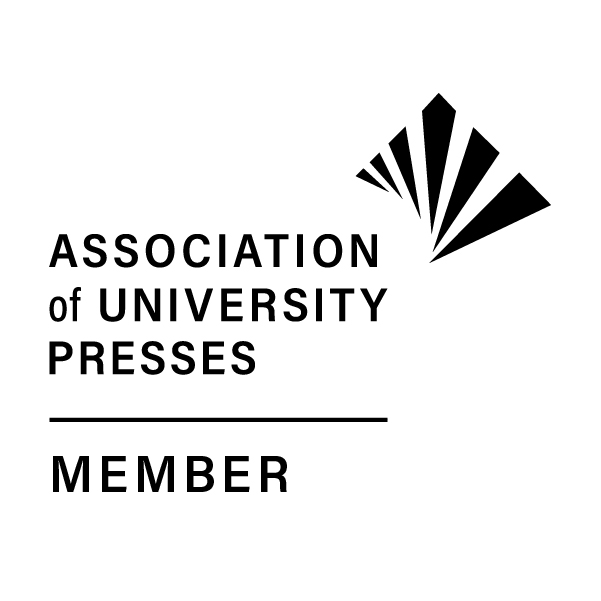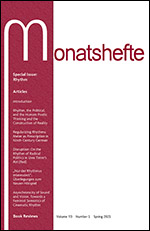|


|

Subscribe
Read the Journal Online
Submission Guidelines
Editorial Board
Receive Email Updates
Advertise in Monatshefte
Indexes/Abstracts
Current Issue TOC
Back Issues TOC
Monatshefte 2022 Subscription Rates
Institutions:
print & online $271
online only $233
Individuals:
print & online $103
online only $86
Non U.S. Postage (no postage charges for online-only subscriptions)
Airmail: add $40/yr.
Canadian Subscribers: add 5% GST. |
Monatshefte
Volume 113, Number 2, Summer 2021
Table of Contents
ARTICLES
Edward James Weintraut
Regina Scheer’s Machandel: The Crossroads of Unforgetting,
Remembrance, and Forgetting
In her debut novel, Machandel (2014), Regina Scheer offers a panoramic portrayal of 20th- and 21st-century experiences on East German soil, ranging from the plight of four individuals in the 1940s to the disillusionment of three in post-unification Germany. As she explores this chronology Scheer abstains from making any accusations or condemnations, nor does she indulge in any (n)ostalgic sentiment. She allows the five main characters to recount their life story in direct interior monologues; at no point are their musings challenged by other characters or contextualized by authorial intervention. These private revelations are accompanied by rationales for both sharing and repressing memories, especially those triggered by trauma. Machandel does not resolve the dynamic between remembering and forgetting, but invites the reader to invest emotionally in the stories presented, drawing personal conclusions about what should or should not be passed on to future generations. (EJW)
Berna Gueneli
Turkish Émigrés, European Artists: Re/Discovering a Web of Turkish-European Artists in 1980s West Germany and Europe
In 1980, the (third) military coup in Turkey resulted in mass emigration. Among the émigrés were several artists, including filmmakers, actors, singer-songwriters, painters, and sculptors, who moved, for example, to Germany, Sweden, and France. They began to form a European web of émigrés working on music, film, theater, and paintings, thereby creating an artistic diaspora. This article identifies a group of lesser-studied émigré artists in Germany and Europe, lays out their networks and creative practices, and ultimately shifts the perspective on migration in the 1980s. Films such as Yilmaz Güney’s The Wall (1982) in France, Tuncel Kuritz’s Hasan the Rose/Gül Hasan (1980) in Sweden, musical recordings such as Cem Karaca’s “Die Kanaken” (1984) in Cologne, and the work of artist Ismail Saray in London of the 1980s, among others, help to show their asymmetrical web of trans-European connections. (BG)
Jens Pohlmann
Heiner Müller’s Cooperation with the “Institution of Art”—An Analysis of His Performance at the Büchnerpreis Award Ceremony
Heiner Müller was celebrated in the West as an East German dissident, but he was also respected as a fierce critic of capitalist society by the West German left. His award speech at the Büchnerpreis award ceremony in 1985 has been interpreted as a rebellion against the social norms of the West German “Kulturbetrieb,” with which he resisted co-optation by the cultural establishment. In this essay, I take another look at Müller’s performance at the award ceremony and examine the extent to which this literary prize posed a threat to his image as avant-garde author and critic of capitalist society. My interpretation re-evaluates Müller’s aesthetic and performative strategies when maneuvering within the circumstances of a Western media public sphere, as he did in and increasingly after accepting the prize. I claim that Müller’s performance displays the difficulties of presenting an artistic critique of capitalism within a Western media public sphere and under the influence of a developing brand culture. (JP)
Simon Schoch
Kellers Novellierung der Gattung: Der Schmied seines Glückes als Schreib-Szene einer uneigentlichen Novellistik
Keller’s Seldwyla cycle serves as a prime example of the 19th-century novella. A detailed account of its compositional complexity, however, reveals “significant ruptures, disturbing divergence, and a troublesome variety” (Aust) that continue to raise the question of genre. I argue that Seldwyla, in contrast to the “authentic novellas” of Keller’s Galatea project, designates the site of a formal inauthenticity negotiating a genre “in flux,” “yet to be determined” (Keller). In particular, my article investigates a key element of the novella, both indispensable and disputed, namely the unheard-of incident (“unerhörte Begebenheit”). For this reason, my essay focuses on Keller’s Der Schmied seines Glückes, a widely neglected part of the cycle that revolves around the scene of writing as its pivotal event. Keller’s “writing-scene” (Campe), I argue, does not only serve as framework of genre-specific self-reflection, it articulates the “Begebenheit” itself, thus situating the novella at the very edge of its genre and, hence, at the threshold of a modernist writing that “has no other law than that of affirming […] its own existence” (Foucault). (SS; in German)
Marie-Luise Goldmann
Ghosting: Narratives of Noncommunication in the Digital Age (Röggla, Grjasnowa, von Rönne)
This article examines narratives of “ghosting”—the act of cutting off all contact with someone without explanation—in three 21st-century novels, namely Kathrin Röggla’s wir schlafen nicht (2004), Olga Grjasnowa’s Der Russe ist einer, der Birken liebt (2012), and Ronja von Rönne’s Wir kommen (2016). While the relatively recent phenomenon has received increased attention in the popular press as well as in psychology and sociology, it has remained unrecognized in the field of literary studies. This study remedies this gap by focusing on scenes of noncommunication and disconnection against the backdrop of digital imperatives of availability and connectivity. In particular, it highlights narrative techniques that resemble ghosting such as open endings that resist closure, monologues that communicate unidirectionally, featureless characters that lack responsibility, and fragmentary writing that consists of informational gaps. Rethinking disappearances in the digital age, contemporary literature ultimately reflects on its own mediality. (M-LG)
Mattias Pirholt
Imitation, Interest, and the Ethics of Imperfection in Karl Philipp Moritz’s Aesthetics, 1786–1788
This article traces the development of Karl Philipp Moritz’s writings on aesthetics that were produced in the aftermath of the essay “Über den Begriff des in sich selbst Vollendeten” and that led up to the influential treatise Über die bildende Nachahmung des Schönen. The writings from this short period from 1786 through 1788 are epitomized by an increasing awareness of the deficiencies associated with human-made products, including works of art. Art is a formative imitation or imprint of nature’s eternal perfection but is in itself imperfect and transient. However, this lack of perfection is the very impetus behind all man’s ethical endeavors, that is, the struggle for nobility and love. By construing the work of art as fundamentally flawed and ephemeral, Moritz’s aesthetics problematizes the idea of perfection as well as the notion of aesthetic autonomy. (MP)
BOOK REVIEWS
Ammon, Frieder von und Rüdiger Zymner, Hrsg., Gedichte von Thomas Kling. Interpretationen (Erk Grimm)
Bartram, Graham, Sarah McGaughey, and Galin Tihanov, eds., A Companion to the Works of Hermann Broch (Steve Dowden)
Bischoff, Doerte und Susanne Komfort-Hein, Hrsg., Handbuch Literatur & Transnationalität (Oksana Stoychuck)
Brambora, Johannes, Von Hungerlöhnern, Fabriktyrannen und dem Ideal ihrer Versöhnung. Der Beitrag des populären Romans zur Entstehung eines sozialen Erklärungsmusters ökonomischer Gegensätze der Industrialisierung. 1845–1862 (Jost Hermand)
Danneberg, Lutz, Annette Gilbert und Carlos Spoerhase, Hrsg., Das Werk. Zum Verschwinden und Fortwirken eines Grundbegriffs (Christian Benne)
Eddy, Beverley Driver, Erika and Klaus Mann: Living with America (Brigitte E. Jirku)
Gelderloos, Carl, Biological Modernism: The New Human in Weimar Culture (Thomas Rohkramer)
Giuriato, Davide, Philipp Hubmann und Mareike Schildmann, Hrsg., Kindheit und Literatur. Konzepte – Poetik – Wissen (Pia Schmid)
Handelman, Matthew, The Mathematical Imagination: On the Origins and Promise of Critical Theory (Jocelyn Holland)
Kellner, Beate, Spiel der Liebe im Minnesang (Adam Oberlin)
Knapp, Lore, Hrsg., Literarische Netzwerke im 18. Jahrhundert. Mit den Übersetzungen zweier Aufsätze von Latour und Sapiro (Robert Walter-Jochum)
Kniesche, Thomas W., ed., Contemporary German Crime Fiction: A Companion (Julia Karolle-Berg)
Lau, Martin, Hanns von Gumppenberg (1866–1928). Ein Münchner Schriftsteller zwischen Okkultismus, Kabarett und Kritik (Alan Lareau)
Lieb, Constantin, Hermann Korte und Peter Geist, Hrsg., Materie: Poesie. Zum Werk Gerhard Falkners (Erk Grimm)
Metz, Bernhard, Die Lesbarkeit der Bücher. Typographische Studien zur Literatur (Peter Krapp)
Niefanger, Dirk und Dirk Rose, Hrsg., „Gesammlet und ans Licht gestellet“. Poesie, Theologie und Musik in Anthologien des frühen 18. Jahrhunderts (Rolf J. Goebel)
Peitsch, Helmut et al., Hrsg., Nachkriegsliteratur als öffentliche Erinnerung. Deutsche Vergangenheit im europäischen Kontext (Liisa Steinby)
Pfeifer, Annie und Reto Sorg, Hrsg., „Spazieren muss ich unbedingt“. Robert Walser und die Kultur des Gehens (Jan Plug)
Rupprecht, Caroline, Asian Fusion: New Encounters in the Asian-German Avant-Garde (Qinna Shen)
Schmitz-Emans, Monika, Enzyklopädische Phantasien. Wissensvermittelnde Darstellungsformen in der Literatur – Fallstudien und Poetiken (Thomas Scholz)
Sutton, Katie, Sex Between Body and Mind: Psychoanalysis and Sexology in the German-speaking World, 1890s–1930s (Javier Samper Vendrell)
BOOKS RECEIVED
|

